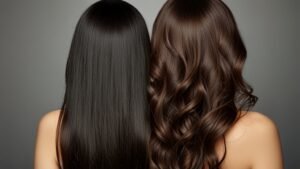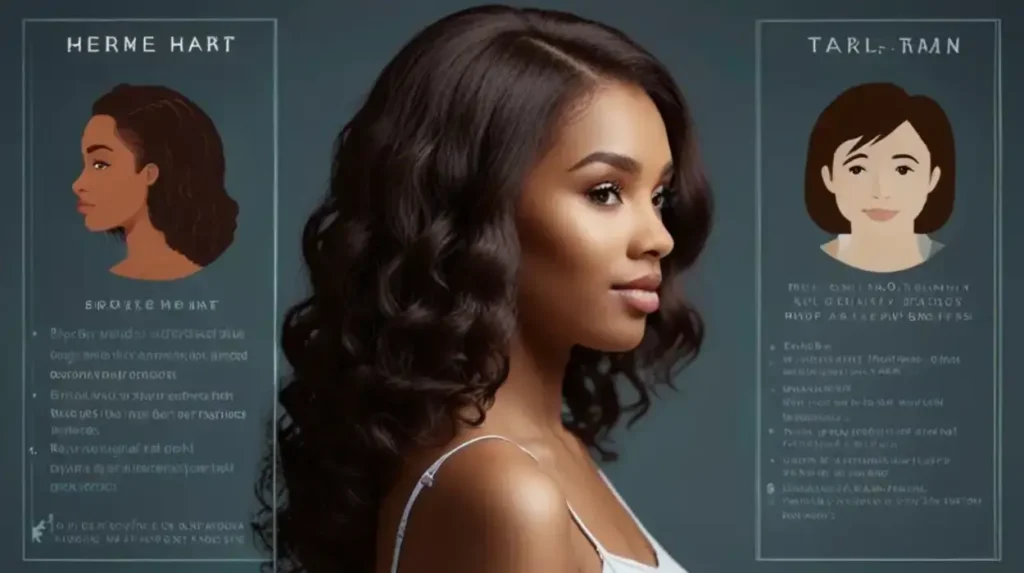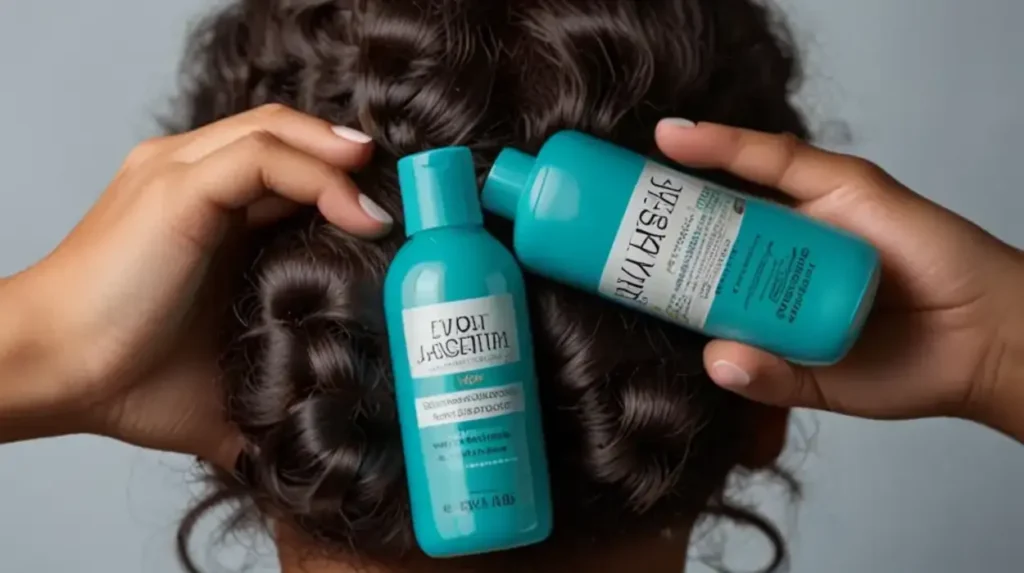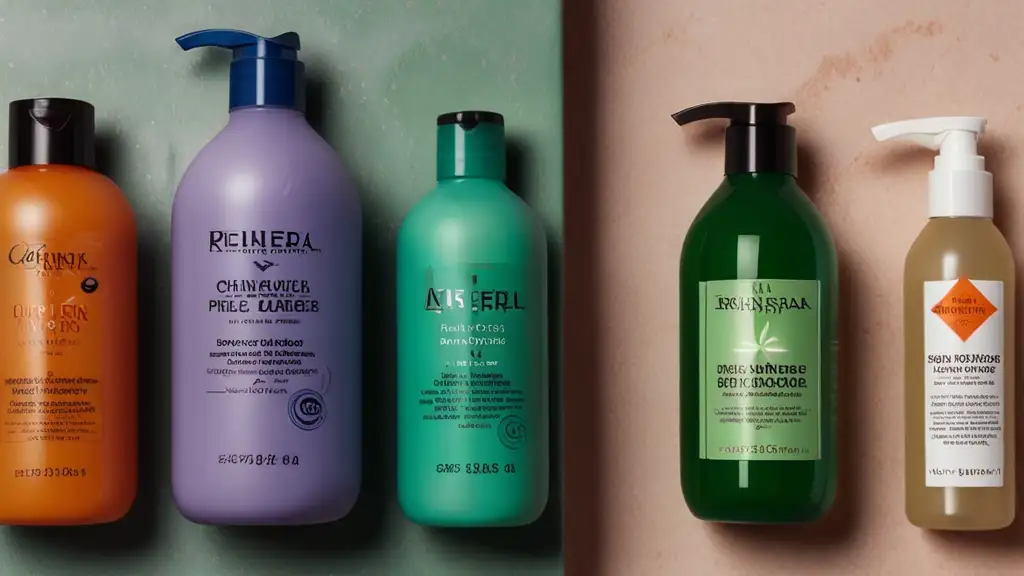Many people believe that hair breakage is just a natural part of hair growth, something that can’t be avoided. But that’s not true! Hair breakage isn’t inevitable. In fact, using the right products, especially the Best Shampoo for Breakage, can make a world of difference in keeping your hair healthy, strong, and beautiful. Let’s dive into what makes hair breakage such a common problem and why choosing the Best Shampoo for Breakage matters more than you might think.

The Struggle with Hair Breakage
We’ve all been there—running your fingers through your hair, only to see a few strands come away in your hand. It’s frustrating, right? Hair breakage can be a real confidence killer, making your hair look thin, damaged, and lifeless. But here’s the thing: breakage isn’t just about how your hair looks; it’s also a sign that your hair is weak and in need of some serious TLC.
Hair breakage happens when the strands of your hair snap due to dryness, lack of moisture, or excessive styling. It’s different from hair loss, which involves the entire hair follicle. When your hair breaks, it’s because the strands themselves are too weak to withstand the everyday stresses we put them through—things like brushing, styling, or even just exposure to the elements. That’s why finding the best shampoo for breakage is so important. The right shampoo can strengthen your hair, reducing breakage and giving you the luscious, full hair you’ve always wanted.
Why Choosing the Right Shampoo Matters
You might think that any shampoo will do the job, but that’s where a lot of us go wrong. Not all shampoos are created equal, especially when it comes to treating breakage. The best shampoo for breakage isn’t just about cleaning your hair; it’s about nourishing and repairing it from within. That’s why you need a shampoo that’s packed with ingredients designed to strengthen your hair, like keratin, biotin, and proteins. These ingredients work to rebuild the hair’s structure, making it stronger and less prone to breakage.
But it’s not just about the ingredients; it’s also about what’s not in your shampoo. Many shampoos on the market are loaded with harsh chemicals like sulfates and parabens, which can strip your hair of its natural oils and make breakage even worse. Opting for a sulfate-free shampoo is often a better choice, especially if your hair is already fragile. These shampoos are gentler on your hair, helping to retain moisture and keep your hair strong.

Choosing the right shampoo is the first step in your journey to healthier hair. It’s about more than just stopping breakage—it’s about giving your hair the nourishment it needs to grow strong and stay beautiful. Whether you’re dealing with severe hair breakage, thinning hair, or just want to prevent future damage, finding the best shampoo for your hair type is key.
What Causes Hair Breakage?
Common Factors Leading to Hair Breakage
Hair breakage can seem like it comes out of nowhere, but it’s usually the result of several factors. Understanding what causes hair breakage is the first step in preventing it. One of the biggest culprits? Over-styling. Heat styling tools like straighteners, curling irons, and blow dryers can wreak havoc on your hair if used too often or without proper protection. The high temperatures break down the hair’s protein structure, leading to weak, brittle strands that snap easily.
Another common cause of hair breakage is chemical treatments. Coloring your hair, perming, or relaxing it can all weaken the hair shaft, making it more prone to breaking. These treatments alter the natural structure of your hair, often stripping it of moisture and leaving it dry and vulnerable. If you frequently dye or chemically treat your hair, you’re at a higher risk of breakage.
Let’s not forget about poor hair care habits. Things like brushing your hair when it’s wet (when it’s most fragile), using the wrong type of brush, or even tying your hair too tightly can lead to breakage. Environmental factors like sun exposure, wind, and pollution can also dry out your hair, leading to split ends and breakage. It’s important to be mindful of how you treat your hair daily because small changes in your routine can make a big difference in preventing breakage.
Signs Your Hair Needs Repair
So, how do you know if your hair is on the brink of breaking? There are a few tell-tale signs that your hair needs some serious repair. One of the most obvious signs is split ends. When the protective outer layer of your hair wears away, the strands begin to split, creating those dreaded frayed ends. If left untreated, these splits can travel up the hair shaft, leading to more breakage.
Another sign that your hair needs repair is excessive frizz. While a little frizz is normal, especially in humid conditions, excessive frizz can be a sign that your hair is dry and damaged. This dryness makes the hair strands weak and more likely to snap when brushed or styled. You might also notice that your hair feels thinner or looks dull and lifeless. These are signs that your hair’s health is compromised and needs the right products to restore its strength and shine.
If you’re experiencing any of these issues, it’s time to rethink your hair care routine. Using a shampoo specifically designed to address breakage can help reverse the damage and protect your hair from future harm. Remember, the goal isn’t just to stop breakage—it’s to nourish and strengthen your hair from the inside out. With the right care and attention, you can restore your hair’s health and keep it looking its best.
Top 3 Shampoos for Breakage That You Should Try
Let’s clear something up right from the start: there’s no “magic” shampoo that will instantly fix hair breakage overnight. While a good shampoo for breakage can make a big difference, the key to improving your hair in the long run is using the right products regularly and taking proper care of your hair. Now that we’ve got that sorted, let’s look at some of the best shampoos available that can help reduce and prevent hair breakage.
1. Shea Moisture Shampoo
SheaMoisture Jamaican Black Castor Oil Shampoo is a nourishing formula designed to strengthen and restore damaged hair. Infused with Jamaican black castor oil and certified organic shea butter, this shampoo helps reduce breakage and promote healthy hair growth. It’s sulfate-free, making it gentle on your hair while effectively cleansing and moisturizing. Ideal for those with chemically processed or heat-damaged hair, it leaves your strands feeling soft, strong, and rejuvenated.
Feature
- Strengthens Hair: Reduces breakage with Jamaican black castor oil.
- Moisturizes: Softens and conditions with shea butter.
- Sulfate-Free: Cleanses gently without stripping natural oils.
- Promotes Growth: Supports healthy hair growth.
- Restores Damage: Ideal for chemically processed or heat-damaged hair.

2. Nioxin Cleanser Shampoo
Nioxin Cleanser Shampoo System 2 is a clarifying shampoo designed to refresh and cleanse thinning hair. It helps remove buildup from styling products and environmental pollutants, while strengthening and nourishing the hair and scalp. Formulated with a blend of botanicals and technology to promote a healthy scalp environment, it supports thicker, fuller-looking hair. Ideal for those with fine or thinning hair.
Feature
- Cleanses Thoroughly: Removes buildup from styling products and pollutants.
- Strengthens Hair: Fortifies and nourishes the hair and scalp.
- Promotes Healthy Scalp: Supports a balanced and healthy scalp environment.
- Enhances Thickness: Helps create the appearance of thicker, fuller hair.
- Formulated for Thinning Hair: Ideal for fine or thinning hair types.

3. Pantene Pro-V Protect Shampoo
Pantene Pro-V Repair & Protect Shampoo is designed to restore and strengthen damaged hair. Infused with Pantene’s Pro-V Nutrient Blend, it helps repair and protect hair from damage caused by styling and environmental factors. This shampoo gently cleanses while reinforcing hair’s natural strength, leaving it smooth, shiny, and resilient. Ideal for those seeking to revitalize and safeguard their hair.
Feature
- Repairs Damage: Restores and strengthens damaged hair.
- Protects Hair: Shields against damage from styling and environmental factors.
- Nourishes: Infused with Pantene’s Pro-V Nutrient Blend for added strength.
- Gently Cleanses: Cleans hair without stripping natural oils.
- Enhances Shine: Leaves hair smooth, shiny, and resilient.

How to Choose the Best Shampoo for Your Hair Type
Just as important as knowing which shampoos to try is understanding how to choose the best one for your specific hair type. Not all shampoos are created equal, and what works wonders for one person might not be the best fit for someone else. Let’s break down the key factors to consider when selecting the right shampoo for breakage.
1. Your Understanding Hair’s Needs
Before you can pick the right shampoo, you need to understand what your hair needs. Is your hair dry and brittle, or is it oily and prone to breakage due to excess styling? Maybe your hair is thinning, and you need a shampoo that can both prevent breakage and promote hair growth. Identifying your hair’s specific needs will help you narrow down your options and choose a product that’s designed to address those concerns.
2. Key Ingredients to Look For
When it comes to preventing breakage, ingredients are everything. Look for shampoos that contain keratin, biotin, and proteins—these are the building blocks your hair needs to repair and strengthen itself. Keratin, in particular, is a protein that naturally occurs in your hair, and using a keratin-infused shampoo can help rebuild damaged strands. Biotin, also known as Vitamin B7, is another key ingredient that strengthens hair and promotes growth, making it a must-have in any shampoo designed to combat breakage.
Avoid shampoos with harsh chemicals like sulfates, which can strip your hair of its natural oils and make breakage worse. Instead, opt for sulfate-free shampoos, which are gentler on your hair and scalp. These shampoos help maintain your hair’s natural moisture balance, which is crucial for keeping your hair strong and healthy.
3. Should You Go Sulfate-Free?
Sulfate-free shampoos have become increasingly popular, and for good reason. Sulfates are cleansing agents that create a rich lather, but they can also be too harsh for delicate or damaged hair. If your hair is prone to breakage, switching to a sulfate-free shampoo might be one of the best decisions you can make. These shampoos are less likely to strip your hair of its natural oils, which means they help keep your hair hydrated and less prone to breaking.
4. Pairing with the Right Conditioner
Your shampoo is only half of the equation. To really protect your hair from breakage, you’ll need to pair it with the right conditioner. A good conditioner will help lock in moisture, smooth your hair’s cuticle, and provide an extra layer of protection against damage. Look for a conditioner that complements your shampoo—many brands offer matching shampoo and conditioner sets designed to work together to maximize results.
Choosing the best shampoo for breakage involves more than just picking up the first bottle you see on the shelf. By understanding your hair’s needs, focusing on the right ingredients, and considering whether a sulfate-free option is right for you, you can find a product that not only prevents breakage but also promotes healthier, stronger hair.

How to Maximize the Effectiveness of Your Anti-Breakage Shampoo
There’s a common belief that just using the best shampoo for breakage will instantly solve all your hair problems. While the right shampoo is definitely a crucial part of the equation, it’s not the only step you should be taking. Maximizing the effectiveness of your anti-breakage shampoo involves a comprehensive hair care routine that includes proper washing techniques, pairing your shampoo with the right conditioner, and incorporating nourishing treatments into your regimen. Let’s explore how to get the most out of your anti-breakage shampoo to achieve stronger, healthier hair.
1. Proper Washing Techniques for Breakage Prevention
You might think that washing your hair is straightforward, but there’s actually a right and wrong way to do it—especially if you’re dealing with breakage. First, avoid using hot water to wash your hair. Hot water can strip your hair of its natural oils, leading to dryness and making it more prone to breakage. Instead, use lukewarm water, which is gentle on your hair and scalp.
When applying your shampoo, focus on your scalp rather than your hair ends. The scalp is where oils and dirt accumulate, so it’s important to cleanse this area thoroughly. Gently massage the shampoo into your scalp using your fingertips, not your nails. Scratching can damage your scalp and weaken your hair at the roots, leading to more breakage. Once your scalp is clean, let the shampoo run down the lengths of your hair to clean the rest. There’s no need to rub your hair aggressively—this can cause further damage to already fragile strands.
After rinsing out the shampoo, finish with a cool water rinse. Cool water helps to seal the hair cuticle, locking in moisture and adding shine. This simple step can make a big difference in reducing breakage and keeping your hair looking smooth and healthy.
2. Pairing with the Right Conditioner
As mentioned earlier, using the right conditioner is just as important as using the best shampoo for breakage. Conditioner helps to replenish the moisture that your hair loses during washing, making it essential for keeping your hair strong and hydrated. Look for a conditioner that complements your shampoo and is specifically designed to prevent breakage. Ingredients like keratin, argan oil, and biotin are excellent for strengthening your hair and reducing the risk of breakage.
When applying conditioner, focus on the mid-lengths and ends of your hair, which are the most prone to damage. Avoid applying conditioner directly to your scalp, as this can make your hair look greasy. Let the conditioner sit for a few minutes to allow it to deeply penetrate and nourish your hair. Rinse it out with cool water to seal the hair cuticle, just like you did with your shampoo.
3. Regular Hair Treatments for Added Protection
If you’re serious about preventing breakage, incorporating regular hair treatments into your routine is a must. Deep conditioning treatments, hair masks, and leave-in conditioners can provide your hair with the extra moisture and nutrients it needs to stay strong. These treatments are especially beneficial for those with severely damaged or dry hair, as they can help to repair and fortify the hair shaft.
Consider using a deep conditioning treatment once a week to give your hair an intense dose of hydration. Look for products that contain strengthening ingredients like proteins, which can help rebuild the hair’s structure. Leave-in conditioners are also great for providing ongoing protection throughout the day, especially if your hair is exposed to environmental stressors like sun, wind, or pollution.
4. Avoiding Common Hair Care Mistakes
Even with the best shampoo and conditioner, certain hair care habits can undermine your efforts to prevent breakage. One of the most common mistakes is brushing wet hair. Wet hair is more fragile and prone to breakage, so it’s important to be gentle. Use a wide-tooth comb or a detangling brush to gently work through any knots, starting from the ends and working your way up.
Another mistake to avoid is over-styling your hair with heat tools like flat irons, curling wands, and blow dryers. These tools can weaken your hair over time, leading to breakage. If you must use heat, always apply a heat protectant spray to minimize damage. Additionally, try to limit the use of heat tools and embrace more natural styling methods whenever possible.
5. Protecting Your Hair While You Sleep
Believe it or not, the way you treat your hair while you sleep can also impact breakage. Cotton pillowcases can create friction against your hair, causing it to tangle and break while you toss and turn at night. Switching to a silk or satin pillowcase can reduce this friction, helping to keep your hair smooth and intact.
Another tip is to tie your hair up loosely before bed. Avoid tight hairstyles like ponytails or buns, which can pull on your hair and cause breakage. Instead, opt for a loose braid or simply let your hair hang down. You can also wrap your hair in a silk scarf for added protection.
Common Mistakes to Avoid When Dealing with Hair Breakage
Many of us make simple mistakes in our daily hair care routine that can contribute to hair breakage without even realizing it. Let’s debunk some of these common errors and discuss how to avoid them so you can protect your hair and keep it looking its best.

1. Over-Washing Your Hair
One of the biggest mistakes people make is over-washing their hair. While it’s important to keep your hair clean, washing it too frequently can strip away the natural oils that keep your hair moisturized and strong. This can lead to dryness and, ultimately, breakage. If your hair tends to be on the drier side, try washing it only two to three times a week. On the other days, you can use a dry shampoo to refresh your hair without the risk of over-drying it.
2. Using the Wrong Hairbrush
The type of brush you use matters more than you might think. Using a brush with hard bristles can tug on your hair and cause breakage, especially if your hair is already fragile. Instead, opt for a brush with soft, flexible bristles that glide through your hair without pulling. If your hair is prone to tangling, consider using a wide-tooth comb instead of a brush to gently detangle your strands without causing damage.
3. Neglecting Regular Trims
It might seem counterintuitive, but getting regular trims is essential for preventing hair breakage. When you let split ends go unchecked, they can travel up the hair shaft and cause more extensive damage. By trimming your hair every 6-8 weeks, you can remove these damaged ends before they have a chance to break, keeping the rest of your hair healthy and strong.
4. Ignoring Heat Protectant
We all love the sleek look that comes from using heat styling tools, but ignoring heat protectant is a big no-no if you want to avoid breakage. Heat protectant sprays and serums create a barrier between your hair and the high temperatures of styling tools, helping to minimize damage. Make it a habit to apply heat protectant every time you use heat on your hair, whether you’re blow-drying, straightening, or curling.
5. Not Paying Attention to Diet
Your hair’s health isn’t just about what you put on it—it’s also about what you put in your body. A diet lacking in essential nutrients like vitamins, minerals, and proteins can weaken your hair and make it more prone to breakage. Make sure you’re eating a balanced diet rich in foods that promote hair health, such as leafy greens, nuts, seeds, and lean proteins. If needed, consider taking a biotin or hair growth supplement to give your hair an extra boost.
Conclusion
Taking care of your hair and preventing breakage isn’t just about picking the best shampoo—it’s about creating a complete hair care routine that nourishes, protects, and strengthens your locks. From using the right washing techniques to pairing your shampoo with a hydrating conditioner and avoiding common hair care mistakes, every step matters. Remember, healthy hair starts with understanding your unique needs and making small, consistent changes that add up over time.
Whether you’re dealing with breakage, dryness, or just want stronger hair, the key is to be gentle and mindful of how you treat your hair every day. Incorporate the right products, eat a balanced diet, and give your hair the love and care it deserves. With the right approach, you’ll not only prevent breakage but also enjoy healthier, more resilient hair that looks and feels great.
So, take a deep breath, make those small changes, and watch your hair transform. You’ve got this!

FAQs About Hair Breakage and Strengthening
1. What’s the best shampoo for hair breakage and loss in females?
Finding the best shampoo for hair breakage and loss can be tricky, especially for females who may experience these issues due to various factors like hormonal changes or styling habits. Look for shampoos that are sulfate-free and contain ingredients like biotin, keratin, or argan oil, which are known to strengthen hair and reduce breakage.
2. What’s the best shampoo for breakage according to Reddit?
Reddit users often recommend Olaplex No. 4 Bond Maintenance Shampoo for breakage. It’s praised for its ability to repair and strengthen damaged hair. Other popular mentions include the Shea Moisture Jamaican Black Castor Oil Shampoo and the Redken Extreme Shampoo.
3. Which shampoo is best for hair according to doctors?
Doctors often recommend shampoos that are gentle, sulfate-free, and contain nourishing ingredients. Brands like Nizoral, which is often recommended for those dealing with scalp issues, and the OGX Biotin & Collagen Shampoo are commonly suggested. Always consult with a dermatologist for personalized advice.
4. What’s the best shampoo for dry, frizzy hair?
If you’re dealing with dry, frizzy hair, you’ll want a shampoo that’s hydrating and smoothing. Look for products with ingredients like argan oil, shea butter, and glycerin. Some top picks include the Moroccanoil Hydrating Shampoo and the Living Proof No Frizz Shampoo.
5. How can I repair damaged hair fast at home?
Repairing damaged hair at home quickly involves a few steps. Start with a deep conditioning treatment or hair mask once a week. Use products with protein to strengthen your hair. You can also apply coconut oil overnight as a natural remedy. Avoid heat styling and harsh chemicals during this time to give your hair a break.
6. Why does my hair break easily?
Hair can break easily due to several reasons: overuse of heat styling tools, chemical treatments like coloring or perms, lack of moisture, or even nutritional deficiencies. Stress and poor hair care habits, like brushing too hard, can also contribute.
7. What vitamin deficiency causes hair breakage?
Vitamin deficiencies, especially in biotin (Vitamin B7), can lead to hair breakage. Low levels of vitamins like Vitamin D, iron, and zinc are also associated with weaker hair. Eating a balanced diet or taking supplements can help improve hair health.
8. How can I strengthen my hair?
Strengthening your hair starts with a good diet, rich in proteins, vitamins, and minerals. Use shampoos and conditioners that contain strengthening ingredients like keratin and biotin. Regular trims, reducing heat styling, and using protective hairstyles can also help keep your hair strong.
9. How can I speed up hair growth?
To speed up hair growth, focus on a healthy diet that includes plenty of proteins and vitamins. Scalp massages can also stimulate blood flow to your hair follicles, promoting growth. Additionally, consider using hair growth products like minoxidil or supplements like biotin after consulting with a healthcare provider.
10. Can Vaseline stop hair breakage?
Vaseline can help in a pinch by providing a protective coating that reduces friction and breakage. However, it’s not a long-term solution and can be difficult to wash out. Instead, opt for hair oils or serums specifically designed to strengthen hair and prevent breakage.


